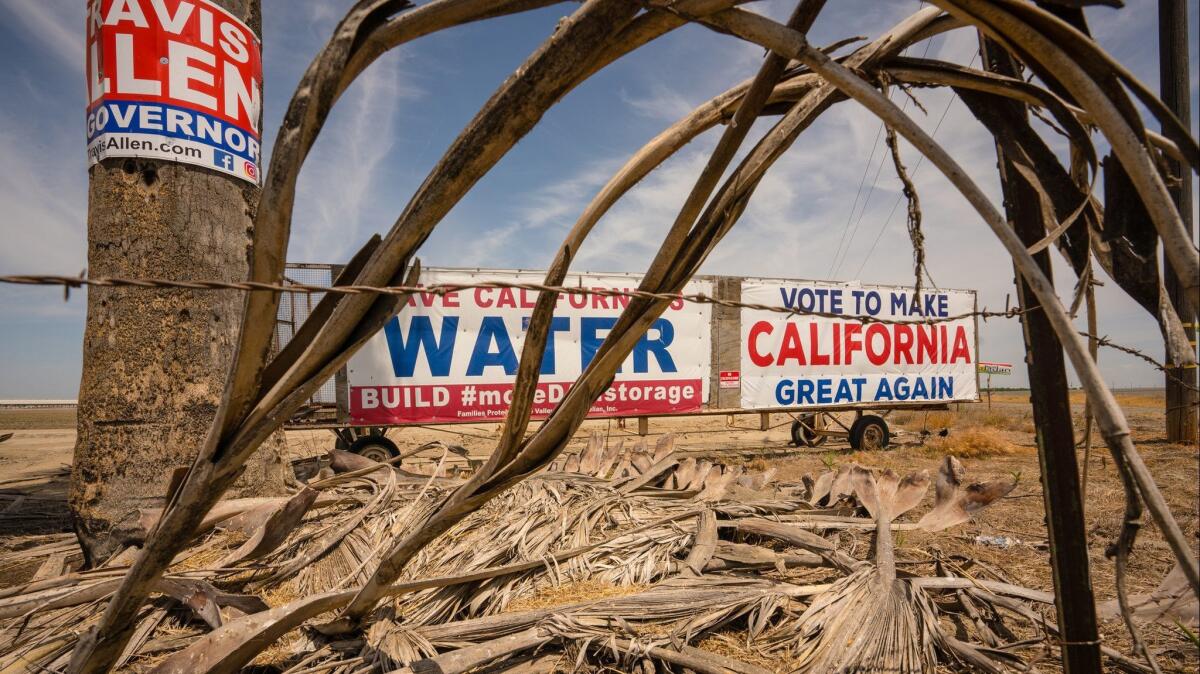Op-Ed: Trump is weaponizing California’s water issues

- Share via
Few political issues have been more contentious in the West than water.
A century ago, politicians like Delph Carpenter, an attorney who helped write and promote the Colorado River Compact, openly waged political war against California, declaring it Colorado’s “greatest water enemy.”
Federal officials have sometimes taken one state’s side over another in water wars. But presidents have historically stayed out, with good reason: Westerners have long viewed Washington’s involvement in water issues with suspicion.
President Trump is suddenly breaking with this norm.
In August, Trump blamed California’s “bad environmental laws” for wasting water that could have been used to fight wildfires.
Given how quickly decisions about water can lead to political and legal warfare in the West, Trump is playing a dangerous game.
In October, he waded into the battle between farmers, conservationists and state officials in the Central Valley over the Sacramento-San Joaquin River Delta, by signing a memo directing federal agencies to speed up a contentious review of endangered species protections that ensure river flow in the delta.
He then doubled down on his criticism of California the following week, complaining publicly that the state has “so much water we don’t know what to do with it” yet foolishly sends its water “into the Pacific.”
Trump’s motivation for attacking California’s water use is clearly partisan. Water policy is critically important to inland voters — second only to the economy, according to a recent survey of Central Valley residents — and Republicans appeared to be betting the issue would decide races in the midterm elections.
But given how quickly decisions about water can lead to political and legal warfare in the West, Trump is playing a dangerous game.
Moreover, he is misguided on the facts. California’s wildfires have virtually nothing to do with its water laws, and the water that drains into the Pacific helps sustain vulnerable ecosystems.
There is a bigger problem: By politicizing water at the federal level, Trump is actually undercutting the ability of states, regions and the country at large to address our growing water woes.
Finding solutions to the nation’s water disputes will require trust. The president’s factually challenged attacks risk destroying what little trust exists between the West’s many thirsty water users.
In some ways more perplexing, Trump’s weaponizing of water issues could also undermine his administration’s own — and largely sound — water policy.
A few days after his most recent attack on California, Trump signed a major new bill to reform how Washington funds and manages water projects. The legislation follows many best practices. It promotes collaboration among water users and the use of green infrastructure to help store water and reduce pollution runoff.
Measures like these are desperately needed. California had barely emerged from its driest period on record when, earlier this year, researchers presented evidence that more “megadroughts” were in store for the Southwest. The future looks even more dire for neighboring states along the Colorado River.
There are no simple solutions to the West’s water shortages. It is going to become increasingly difficult to keep streams and rivers flowing for fishing, rafting and other recreational activities while also retaining enough water to grow staple crops and satiate the Southwest’s thirsty cities.
States play an important role in weighing these tough trade-offs. But so does Washington, which, through federal agencies like the U.S. Army Corps of Engineers and the Bureau of Reclamation, operates and finances most of the infrastructure that stores and delivers water in the region.
For this reason, the federal government must remain a credible, neutral arbiter.
Enter the Fray: First takes on the news of the minute from L.A. Times Opinion »
Most past presidents have understood this. They have tended to repeat either Herbert Hoover’s insistence that water issues “should be left entirely to the states interested” or Lyndon Johnson’s call that states relying on the Colorado River “put aside their differences in favor of regional progress.”
Trump is entering the fray. And he is deviating from tradition by criticizing both California’s water management practices and the federal environmental protections that underpin them.
The timing of Trump’s October memo was hardly a coincidence. Neither was the enthusiastic response of Rep. Devin Nunes, who applauded him for taking on “environmental extremists and overzealous bureaucrats.”
To score political points, Trump is making it more difficult for California to balance the needs of all who depend on its most vital resource.
Scott Moore is a senior fellow at the University of Pennsylvania Water Center and the author of “Subnational Hydropolitics: Conflict, Cooperation and Institution-Building in Shared River Basins.”
Follow the Opinion section on Twitter @latimesopinion or Facebook
More to Read
A cure for the common opinion
Get thought-provoking perspectives with our weekly newsletter.
You may occasionally receive promotional content from the Los Angeles Times.









